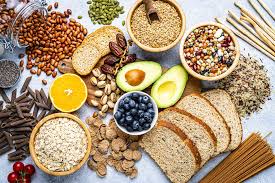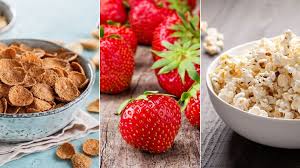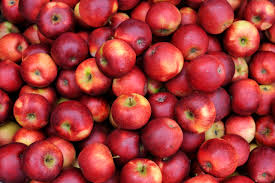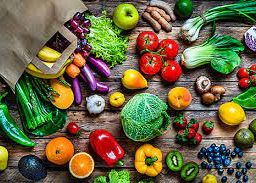
Constipation Relief Foods: Natural Solutions for Digestive Health
Are you struggling with constipation and looking for natural remedies to find relief? Incorporating specific foods into your diet can be a simple yet effective way to manage this uncomfortable condition. In this guide, we’ll explore a variety of ideal foods for managing constipation, along with their benefits and tips on how to use them effectively. From prunes to fiber-rich cereals and flaxseeds to kiwi, we’ll uncover the best options to promote healthy digestion and alleviate constipation symptoms.

Dealing with constipation can be uncomfortable and frustrating. Fortunately, incorporating specific foods into your diet can help alleviate symptoms and promote healthy digestion. In this post, we will explore some ideal foods for managing constipation, along with their benefits and tips on how to use them effectively.
Prunes:
Prunes, or dried plums, are often regarded as a natural remedy for constipation. They are rich in fiber and contain a natural sugar alcohol called sorbitol, which helps soften the stool and promote bowel movements. Enjoy prunes as a standalone snack or try incorporating them into recipes like oatmeal, smoothies, or baked goods.
Fiber-Rich Foods:
Fiber is essential for maintaining healthy digestion and preventing constipation. It adds bulk to the stool, making it easier to pass. Include high-fiber foods such as:

- Fiber-Rich Cereals:
Choosing high-fiber cereals made from whole grains can provide an excellent source of insoluble and soluble fiber. Insoluble fiber adds bulk to the stool, while soluble fiber absorbs water and helps regulate bowel movements. Look for cereals with at least 5 grams of fiber per serving and enjoy them with milk or yogurt. - Whole Grains: Opt for whole wheat, oats, quinoa, brown rice, and barley.
- Fruits: Choose fruits like apples, pears, berries, oranges, and prunes.
- Vegetables: Incorporate leafy greens, broccoli, Brussels sprouts, carrots, and sweet potatoes.
- Legumes: Add beans, lentils, chickpeas, and split peas to your meals.
- Nuts and Seeds: Snack on almonds, walnuts, chia seeds, flaxseeds, and pumpkin seeds.
Flaxseeds:
Flaxseeds are a great source of dietary fiber, including both soluble and insoluble types. They can help add bulk to the stool, ease constipation, and promote regularity. Grind flaxseeds for better absorption, and sprinkle them over yogurt, oatmeal, or salads.
Kiwi:

Kiwi is a fruit rich in fiber, including both soluble and insoluble types. It also contains an enzyme called actinidin, which aids in digestion. Consuming kiwi regularly can help soften the stool and promote bowel regularity. Enjoy kiwi as a snack, add it to fruit salads, or blend it into smoothies.
Leafy Greens:
Leafy greens such as spinach, kale, and Swiss chard are high in fiber and can help relieve constipation. They provide bulk to the stool and contribute to healthy digestion. Incorporate leafy greens into salads, stir-fries, or soups for a nutritious and fiber-rich meal.
Beans and Legumes:
Beans and legumes, including lentils, chickpeas, and kidney beans, are excellent sources of dietary fiber. They promote healthy digestion, add bulk to the stool, and can help alleviate constipation. Include beans and legumes in soups, stews, or salads for a fiber-packed meal.
Yogurt with Probiotics:
Yogurt containing live and active cultures, often referred to as probiotics, can aid in maintaining a healthy gut flora. Probiotics help regulate bowel movements and promote overall digestive health. Look for yogurt with added probiotics and enjoy it as a snack or as a base for smoothies.
Apples:

Apples are rich in fiber, particularly insoluble fiber called cellulose. This type of fiber adds bulk to the stool and promotes regular bowel movements. Enjoy apples as a whole fruit or incorporate them into recipes like salads or baked goods.
Whole Grains:
Whole grains like oats, quinoa, and brown rice are rich in fiber and can help prevent constipation. They provide a good source of insoluble fiber, which adds bulk to the stool and promotes healthy digestion. Replace refined grains with whole grain options for meals such as breakfast cereals, rice dishes, or pasta.
Popcorn:
Popcorn can actually be a helpful addition to your diet when it comes to relieving constipation. This light and crunchy snack is high in dietary fiber, which adds bulk to the stool and promotes regular bowel movements. The fiber content in popcorn helps to soften the stool, making it easier to pass through the digestive system.
Water:

While not a food, staying well-hydrated is essential for maintaining regular bowel movements. Drinking plenty of water throughout the day helps soften the stool and prevent dehydration, which can contribute to constipation. Aim to drink at least 8 cups (64 ounces) of water daily.
By incorporating these foods into your diet and making other lifestyle adjustments, you can improve your digestive health and manage constipation effectively. Remember to prioritize a well-rounded diet, stay hydrated, and listen to your body’s needs.
Disclaimer: The information provided in this content is for general informational purposes only. It is not intended as medical or healthcare advice, diagnosis, or treatment. Always seek the advice of a qualified healthcare professional with any questions you may have regarding a medical condition or healthcare decisions.
















